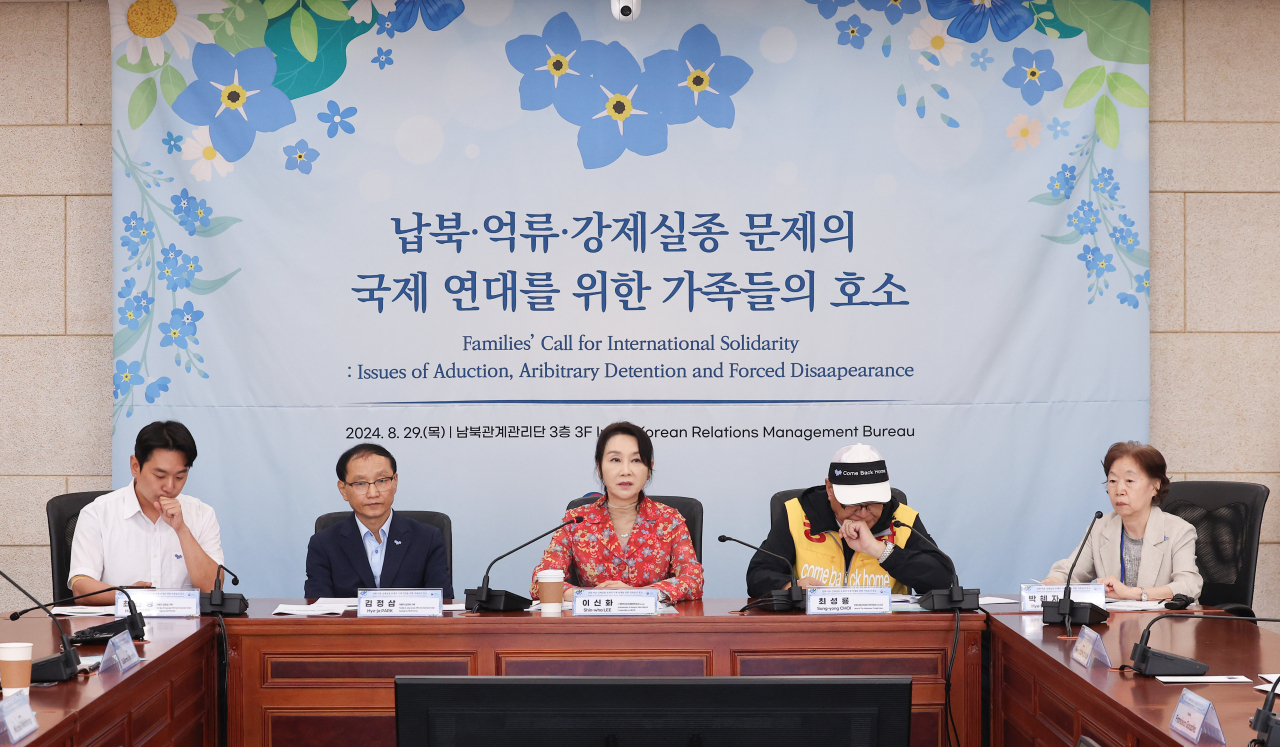Seoul's Foreign Minister urges 'concrete actions' from Tokyo
2024-09-23 02:19:05 [新闻中心] 来源:Anhui News
Seoul’s Foreign Minister Yun Byung-se called for Tokyo’s “concrete actions” to prove its vows to uphold past apologies for its wartime misdeeds, noting Japanese Prime Minister Shinzo Abe’s speech to mark the 70 anniversary of the end of World War II “fell short of Koreans’ expectations.”

In a written interview with The Korea Herald last week, Yun also noted “meaningful, considerable progress” in Seoul’s ongoing negotiations with Tokyo over the issue of Japan’s wartime sexual enslavement of Korean women.
“While there are some aspects of the statement delivered by Prime Minister Abe on Friday that fell short of our expectations, we take note of the fact that he clarified how the preceding administrations’ historical recognition of remorse and apology for the colonial rule and aggression will remain ‘unshakable,’” he said.
“We plan to watch with keen interest how Japan will execute such position into concrete actions.”
As for the prospect of a South Korea-Japan summit, Yun pointed out that there would naturally be a bilateral contact between President Park Geun-hye and Prime Minister Abe should the trilateral summit among the leaders of South Korea, China and Japan be held -- possibly within this year.
Upbraiding Pyongyang for rejecting Seoul’s repeated overtures for dialogue on its denuclearization and carrying out provocative acts including the recent land mine blasts in the Demilitarized Zone, the minister warned that the communist regime would “pay the price” for the provocations.
Touching on the South Korea-U.S. summit slated for October, Yun said that Presidents Park and Barack Obama would present their shared recognition of North Korean issues including the evolving nuclear problem.
Addressing the persistent military threats from the North, which have further escalated ahead of the South Korea-U.S. joint military drills, the summit will also reaffirm the “firm and unwavering U.S. commitment” to the defense of South Korea, and affirm the shared vision of peninsular reunification, Yun said.
Commenting on the maritime disputes in the South China Sea that have been escalating with China constructing artificial islands equipped with military facilities such as an airstrip, Yun reiterated Seoul’s position that differences should be resolved peacefully in accordance with internationally established norms of conduct.
“The South China Sea is one of the world’s major sea lines of communication. Therefore, maintaining the peace and stability of the South China Sea, including the freedom of navigation and overflights, is clearly in the interest of all the countries in the region,” he said.
The following are the excerpts of the interview with Minister Yun.
Korea Herald:The thorniest issue between Seoul and Tokyo for now are the Korean victims who were forced into sexual servitude by Japan during World War II. President Park Geun-hye has mentioned the bilateral negotiations over the issue are at the “final stage.”
Minister Yun:This year alone, eight Korean victims have passed away. Given their old age, the resolution of the matter is urgent. Recognizing the urgency, we have made various efforts to address it. We have so far held eight rounds of intense director general-level talks with Japan since April last year, and our assessment is that there has been some meaningful progress.
I cannot elaborate in detail about the content of the ongoing consultations at this point. But from a broad perspective, we can say that clearly, there has been considerable progress compared to the initial phase of the talks.
Prime Minister Abe said in his speech to mark the 70th anniversary of the end of World War II that Japan wishes to be a country embracing the women whose dignity and honor were hurt during the war. In this respect, we hope that Japan shows sincerity in resolving the matter of comfort women as well.
KH: Amid reports about the prospect of a China-Japan summit, analysts point to the need for a Korea-Japan summit. When do you think the summit can be held and under what conditions?
Yun:Basically, we are open to holding the Korea-Japan summit. Although there remain a number of tough issues, continued bilateral efforts to resolve them wisely and with patience would contribute to improving the relations, thereby creating an environment where the summit talks can actually take place.
Also, as the chair of the trilateral cooperation mechanism of South Korea, Japan and China, Seoul has been continuing diplomatic efforts to hold the trilateral summit at the earliest possible date in the latter half of this year. When the three leaders meet, there would naturally be a bilateral contact. It may be too early to talk about when the trilateral summit will be held, but we hope the meeting to take place within this year at a not too late time.
KH: You have stressed the need for Seoul and Tokyo to work together to create a virtuous cycle for the bilateral relations. What do you think each side should do to entrench such cycle?
Yun:We have been making diverse efforts with determination to make this year -- the 50th anniversary of the normalization of bilateral ties -- a pivotal moment for improvement in relations. I believe that such an atmosphere is being created to a certain extent.
The leaders of both countries each attended events on June 22 to mark the 50th anniversary and expressed their intentions to improve the relations. A total of seven foreign ministerial talks took place including my first visit to Japan in June since I assumed post. The two sides have also settled the issue of Japan’s bid to secure world heritage status for its Meiji-era industrialization facilities through dialogue.
While there are some aspects of the statement delivered by Prime Minister Abe on Friday that fell short of our expectations, we take note of the fact that he clarified how the preceding administrations’ historical recognition of remorse and apology for the colonial rule and aggression will remain unshakable. We plan on watching with keen interest how Japan will execute such position into concrete actions.
Although there are still quite a number of outstanding issues, I believe that should the Japanese government step forward with more enthusiasm to resolve them, the bilateral relations can evolve into a virtuous cycle.
Seoul has been principled in addressing the issue of how history is viewed, even as we intend to actively push ahead with bilateral cooperation that serves our mutual interests, such as in the security, economic, social and cultural realms.
KH: The maritime disputes in the South China Sea have been escalating with China constructing artificial islands equipped with military facilities there. Calls have been growing for Seoul to play a role with regard to the South China Sea disputes.
Yun:The South China Sea is one of the world’s major sea lines of communication. Therefore, maintaining the peace and stability of the South China Sea, including the freedom of navigation and overflights, is clearly in the interest of all the countries in the region.
In this context, my government has been closely following developments in the South China Sea with concern. My government is of the view that differences should be resolved peacefully in accordance with internationally established norms of conduct and this position was reiterated at the recent ARF and EAS Foreign Ministers’ Meeting in Malaysia.
In this regard, we believe that the 2002 Declaration on the Conduct of the Parties in the South China Sea, adopted by China and ASEAN for the maintenance of peace and stability in the South China Sea, should be implemented effectively and in its entirety, and hope that the Code of Conduct in the South China Sea will be concluded at the earliest possible time.
My government takes positive note of the recent dialogues and consultations between ASEAN and China to this end, and looks forward to substantive progress being made toward the early conclusion of the COC.
KH: You have mentioned that there would be a “signification agreement” during the South Korea-U.S. summit slated for October with regard to North Korea. Can you elaborate?
Yun:As this year marks the 70th anniversary of Korea’s liberation from Japan’s colonial rule and 70 years of division, we have made multifaceted efforts to achieve substantive progress on North Korea’s denuclearization. But Pyongyang has not only rejected our overtures for dialogue, but also held fast to its “Byungjin” policy line while continuously advancing its nuclear capabilities. The North has rejected all talks related to its nuclear program with all five parties of the six-party talks.
(With North Korea’s continued threats and provocation) I anticipate that the leaders of South Korea and the U.S. will share their evaluations of the overall security situations on the peninsula including North Korea’s nuclear issue and hold in-depth discussions on how to manage and tackle the current situation and use the occasion to declare their shared perspectives.
I believe the leaders will share their overall view of the region’s situation in its entirety and offer their common understanding on how to resolve the problems of North Korea and its nuclear weapons development.
KH: The issue of the U.S.’ potential deployment of THAAD to Korea is expected to be a tough diplomatic issue. What do you think will be a wise way to address it?
Yun:I understand that internal discussions within the U.S. government are still ongoing and Washington has yet to make any request to Seoul for official consultations. Thus, I think it is inappropriate for me to make a comment based on a hypothetical situation.
This issue should be approached from the perspective that the root cause of the problem is North Korea’s evolving nuclear and missile threats. In light of this, my government has maintained the consistent position that it will make prudent, cool-headed judgment based upon our comprehensive consideration of national interests including security factors.
By Song Sang-ho (sshluck@heraldcorp.com)

In a written interview with The Korea Herald last week, Yun also noted “meaningful, considerable progress” in Seoul’s ongoing negotiations with Tokyo over the issue of Japan’s wartime sexual enslavement of Korean women.
“While there are some aspects of the statement delivered by Prime Minister Abe on Friday that fell short of our expectations, we take note of the fact that he clarified how the preceding administrations’ historical recognition of remorse and apology for the colonial rule and aggression will remain ‘unshakable,’” he said.
“We plan to watch with keen interest how Japan will execute such position into concrete actions.”
As for the prospect of a South Korea-Japan summit, Yun pointed out that there would naturally be a bilateral contact between President Park Geun-hye and Prime Minister Abe should the trilateral summit among the leaders of South Korea, China and Japan be held -- possibly within this year.
Upbraiding Pyongyang for rejecting Seoul’s repeated overtures for dialogue on its denuclearization and carrying out provocative acts including the recent land mine blasts in the Demilitarized Zone, the minister warned that the communist regime would “pay the price” for the provocations.
Touching on the South Korea-U.S. summit slated for October, Yun said that Presidents Park and Barack Obama would present their shared recognition of North Korean issues including the evolving nuclear problem.
Addressing the persistent military threats from the North, which have further escalated ahead of the South Korea-U.S. joint military drills, the summit will also reaffirm the “firm and unwavering U.S. commitment” to the defense of South Korea, and affirm the shared vision of peninsular reunification, Yun said.
Commenting on the maritime disputes in the South China Sea that have been escalating with China constructing artificial islands equipped with military facilities such as an airstrip, Yun reiterated Seoul’s position that differences should be resolved peacefully in accordance with internationally established norms of conduct.
“The South China Sea is one of the world’s major sea lines of communication. Therefore, maintaining the peace and stability of the South China Sea, including the freedom of navigation and overflights, is clearly in the interest of all the countries in the region,” he said.
The following are the excerpts of the interview with Minister Yun.
Korea Herald:The thorniest issue between Seoul and Tokyo for now are the Korean victims who were forced into sexual servitude by Japan during World War II. President Park Geun-hye has mentioned the bilateral negotiations over the issue are at the “final stage.”
Minister Yun:This year alone, eight Korean victims have passed away. Given their old age, the resolution of the matter is urgent. Recognizing the urgency, we have made various efforts to address it. We have so far held eight rounds of intense director general-level talks with Japan since April last year, and our assessment is that there has been some meaningful progress.
I cannot elaborate in detail about the content of the ongoing consultations at this point. But from a broad perspective, we can say that clearly, there has been considerable progress compared to the initial phase of the talks.
Prime Minister Abe said in his speech to mark the 70th anniversary of the end of World War II that Japan wishes to be a country embracing the women whose dignity and honor were hurt during the war. In this respect, we hope that Japan shows sincerity in resolving the matter of comfort women as well.
KH: Amid reports about the prospect of a China-Japan summit, analysts point to the need for a Korea-Japan summit. When do you think the summit can be held and under what conditions?
Yun:Basically, we are open to holding the Korea-Japan summit. Although there remain a number of tough issues, continued bilateral efforts to resolve them wisely and with patience would contribute to improving the relations, thereby creating an environment where the summit talks can actually take place.
Also, as the chair of the trilateral cooperation mechanism of South Korea, Japan and China, Seoul has been continuing diplomatic efforts to hold the trilateral summit at the earliest possible date in the latter half of this year. When the three leaders meet, there would naturally be a bilateral contact. It may be too early to talk about when the trilateral summit will be held, but we hope the meeting to take place within this year at a not too late time.
KH: You have stressed the need for Seoul and Tokyo to work together to create a virtuous cycle for the bilateral relations. What do you think each side should do to entrench such cycle?
Yun:We have been making diverse efforts with determination to make this year -- the 50th anniversary of the normalization of bilateral ties -- a pivotal moment for improvement in relations. I believe that such an atmosphere is being created to a certain extent.
The leaders of both countries each attended events on June 22 to mark the 50th anniversary and expressed their intentions to improve the relations. A total of seven foreign ministerial talks took place including my first visit to Japan in June since I assumed post. The two sides have also settled the issue of Japan’s bid to secure world heritage status for its Meiji-era industrialization facilities through dialogue.
While there are some aspects of the statement delivered by Prime Minister Abe on Friday that fell short of our expectations, we take note of the fact that he clarified how the preceding administrations’ historical recognition of remorse and apology for the colonial rule and aggression will remain unshakable. We plan on watching with keen interest how Japan will execute such position into concrete actions.
Although there are still quite a number of outstanding issues, I believe that should the Japanese government step forward with more enthusiasm to resolve them, the bilateral relations can evolve into a virtuous cycle.
Seoul has been principled in addressing the issue of how history is viewed, even as we intend to actively push ahead with bilateral cooperation that serves our mutual interests, such as in the security, economic, social and cultural realms.
KH: The maritime disputes in the South China Sea have been escalating with China constructing artificial islands equipped with military facilities there. Calls have been growing for Seoul to play a role with regard to the South China Sea disputes.
Yun:The South China Sea is one of the world’s major sea lines of communication. Therefore, maintaining the peace and stability of the South China Sea, including the freedom of navigation and overflights, is clearly in the interest of all the countries in the region.
In this context, my government has been closely following developments in the South China Sea with concern. My government is of the view that differences should be resolved peacefully in accordance with internationally established norms of conduct and this position was reiterated at the recent ARF and EAS Foreign Ministers’ Meeting in Malaysia.
In this regard, we believe that the 2002 Declaration on the Conduct of the Parties in the South China Sea, adopted by China and ASEAN for the maintenance of peace and stability in the South China Sea, should be implemented effectively and in its entirety, and hope that the Code of Conduct in the South China Sea will be concluded at the earliest possible time.
My government takes positive note of the recent dialogues and consultations between ASEAN and China to this end, and looks forward to substantive progress being made toward the early conclusion of the COC.
KH: You have mentioned that there would be a “signification agreement” during the South Korea-U.S. summit slated for October with regard to North Korea. Can you elaborate?
Yun:As this year marks the 70th anniversary of Korea’s liberation from Japan’s colonial rule and 70 years of division, we have made multifaceted efforts to achieve substantive progress on North Korea’s denuclearization. But Pyongyang has not only rejected our overtures for dialogue, but also held fast to its “Byungjin” policy line while continuously advancing its nuclear capabilities. The North has rejected all talks related to its nuclear program with all five parties of the six-party talks.
(With North Korea’s continued threats and provocation) I anticipate that the leaders of South Korea and the U.S. will share their evaluations of the overall security situations on the peninsula including North Korea’s nuclear issue and hold in-depth discussions on how to manage and tackle the current situation and use the occasion to declare their shared perspectives.
I believe the leaders will share their overall view of the region’s situation in its entirety and offer their common understanding on how to resolve the problems of North Korea and its nuclear weapons development.
KH: The issue of the U.S.’ potential deployment of THAAD to Korea is expected to be a tough diplomatic issue. What do you think will be a wise way to address it?
Yun:I understand that internal discussions within the U.S. government are still ongoing and Washington has yet to make any request to Seoul for official consultations. Thus, I think it is inappropriate for me to make a comment based on a hypothetical situation.
This issue should be approached from the perspective that the root cause of the problem is North Korea’s evolving nuclear and missile threats. In light of this, my government has maintained the consistent position that it will make prudent, cool-headed judgment based upon our comprehensive consideration of national interests including security factors.
By Song Sang-ho (sshluck@heraldcorp.com)
(责任编辑:资讯)
推荐文章
-
Military prosecutors indict intel official over leaking 'black agent' info
 (Getty Images Bank)The defense ministry's prosecutors' office on Tuesday indicted a milita
...[详细]
(Getty Images Bank)The defense ministry's prosecutors' office on Tuesday indicted a milita
...[详细]
-
 本周末,盛大的2013年雅安市家居建材展销会就要在润联·美家居建材城开幕了。本着“情牵灾区·让利于民”的宗旨,活动组委会组织了近百家、上千种四川名优家居建材产品,到雅安开展特价、优惠等促销活动。据活动
...[详细]
本周末,盛大的2013年雅安市家居建材展销会就要在润联·美家居建材城开幕了。本着“情牵灾区·让利于民”的宗旨,活动组委会组织了近百家、上千种四川名优家居建材产品,到雅安开展特价、优惠等促销活动。据活动
...[详细]
-
 雅安日报讯10月31日,记者从国网四川雅安电力(集团)股份有限公司(以下简称雅电集团)获悉,经过37天的不懈努力,雅电集团已全面完成宝兴县永富乡中岗村在“8·24”特大泥石流灾害中受损的配电网建设任务
...[详细]
雅安日报讯10月31日,记者从国网四川雅安电力(集团)股份有限公司(以下简称雅电集团)获悉,经过37天的不懈努力,雅电集团已全面完成宝兴县永富乡中岗村在“8·24”特大泥石流灾害中受损的配电网建设任务
...[详细]
-
 雅安日报讯昨(5)日,市重建委驻芦山前线工作组、德阳市援建工作组、芦山县三方联席会议第六次会议召开。会议强调,当前要重点推动新村聚居点的建设工作,抓紧各项重建目标任务的落实。市委副书记、市重建委副主任
...[详细]
雅安日报讯昨(5)日,市重建委驻芦山前线工作组、德阳市援建工作组、芦山县三方联席会议第六次会议召开。会议强调,当前要重点推动新村聚居点的建设工作,抓紧各项重建目标任务的落实。市委副书记、市重建委副主任
...[详细]
-
 本报讯近日,市教育局班子成员碰头会召开,听取近期有关工作落实情况汇报,安排部署下一步重点工作。会议要求,要狠抓工作落实,全面推进教育各项工作。全力推进川西教育中心建设,扎实开展省、市示范性普通高中、义
...[详细]
本报讯近日,市教育局班子成员碰头会召开,听取近期有关工作落实情况汇报,安排部署下一步重点工作。会议要求,要狠抓工作落实,全面推进教育各项工作。全力推进川西教育中心建设,扎实开展省、市示范性普通高中、义
...[详细]
-
 雅安日报讯昨(14)日,全省宣传文化系统召开电视电话会,传达学习全国宣传部长会议精神,安排部署学习宣传贯彻工作,市委常委、宣传部长姜小林出席雅安分会场会议。会议强调,当前和今后一个时期,全省宣传文化系
...[详细]
雅安日报讯昨(14)日,全省宣传文化系统召开电视电话会,传达学习全国宣传部长会议精神,安排部署学习宣传贯彻工作,市委常委、宣传部长姜小林出席雅安分会场会议。会议强调,当前和今后一个时期,全省宣传文化系
...[详细]
-
 增城荔枝、云南大米、东源丝苗米、开平金山茶| “红荔奖”包装设计类参赛作品展播⑥_南方+_南方plus近日,由广东省农业农村厅指导,广东省农业对外经济与农民合作促进中心、广东省农业农村短视频制作推广中
...[详细]
增城荔枝、云南大米、东源丝苗米、开平金山茶| “红荔奖”包装设计类参赛作品展播⑥_南方+_南方plus近日,由广东省农业农村厅指导,广东省农业对外经济与农民合作促进中心、广东省农业农村短视频制作推广中
...[详细]
-
 帮外地游客找住宿,帮遗忘的物品找失主,帮走失的老人找家人……国庆黄金周,有一群人坚守工作岗位,他们在节假日通过加强治安巡逻、打击扒窃犯罪等,在构建国庆安保屏障的同时为民服务,做到有求必应,有难必帮,受
...[详细]
帮外地游客找住宿,帮遗忘的物品找失主,帮走失的老人找家人……国庆黄金周,有一群人坚守工作岗位,他们在节假日通过加强治安巡逻、打击扒窃犯罪等,在构建国庆安保屏障的同时为民服务,做到有求必应,有难必帮,受
...[详细]
-
Families of S. Korean detainees in NK appeal to embassies for support
 Lee Shin-wha, former ambassador for international cooperation on North Korean human rights (center),
...[详细]
Lee Shin-wha, former ambassador for international cooperation on North Korean human rights (center),
...[详细]
-
 雅安日报讯9日,记者从国网四川雅安电力(集团)股份有限公司(以下简称:雅电集团)获悉,该公司因在“安康杯”竞赛活动中成效显著,被评为2012年度全国“安康杯”竞赛优胜单位。近年来,雅电集团始终把安全发
...[详细]
雅安日报讯9日,记者从国网四川雅安电力(集团)股份有限公司(以下简称:雅电集团)获悉,该公司因在“安康杯”竞赛活动中成效显著,被评为2012年度全国“安康杯”竞赛优胜单位。近年来,雅电集团始终把安全发
...[详细]
热点阅读
随机内容

 评论丨农事运动会:一场农民的盛会、新农人风采展现的盛会、城乡双向奔赴的盛会
评论丨农事运动会:一场农民的盛会、新农人风采展现的盛会、城乡双向奔赴的盛会 驾校教练“吃拿卡要”要下课
驾校教练“吃拿卡要”要下课 全国U14男子篮球集训赛 将在我市举行
全国U14男子篮球集训赛 将在我市举行 广东29人!中国工程院公布2023年院士增选有效候选人名单
广东29人!中国工程院公布2023年院士增选有效候选人名单
